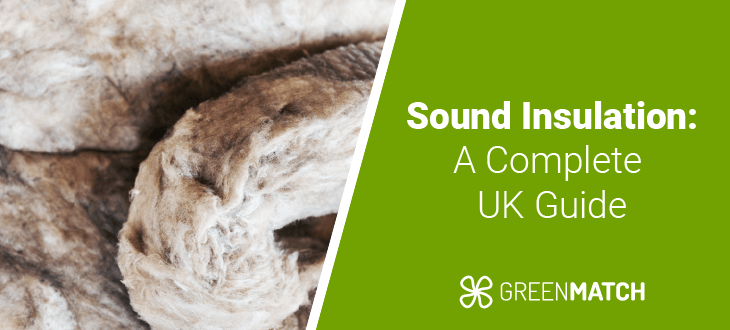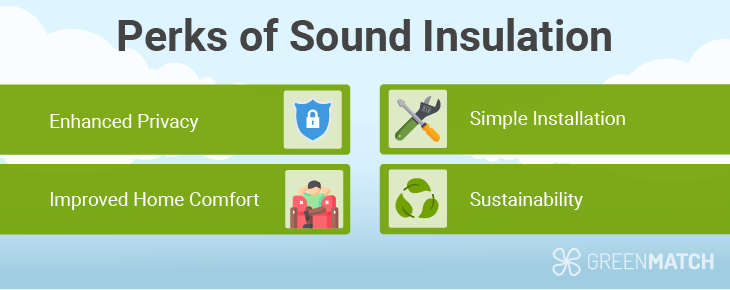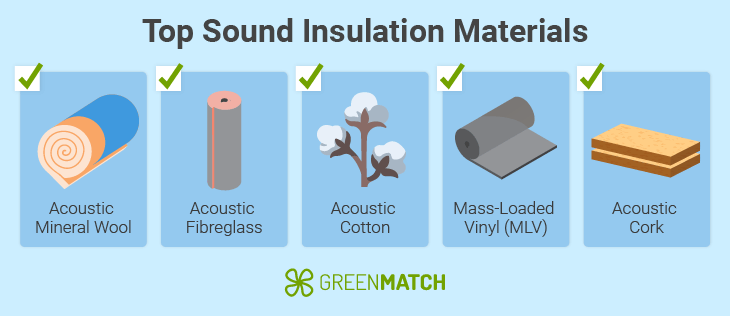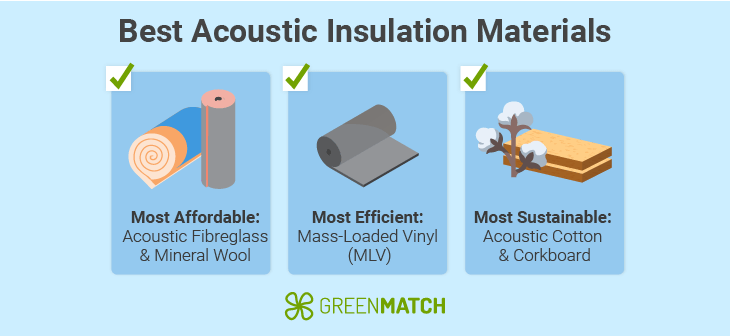Answer these simple questions and we will find you the BEST prices
Which type of solar quotes do you need?
It only takes 30 seconds
100% free with no obligation

Get Free quotes from insulation specialists near you

Save money by comparing quotes and choosing the most competitive offer

The service is 100% free and with no obligation
- GreenMatch
- Insulation
- Soundproof Insulation
Sound Insulation: What Is It, Benefits & Types


- Sound insulation materials are optimised to effectively absorb and reflect sound waves, reducing sound transfer from outside and within the insulated home.
- Proper sound insulation enhances the comfort of your home and improves its privacy, making it ideal for flats and homes in dense urban centres.
- Sound insulation does not provide adequate heat retention and thus can’t double as thermal insulation. However, a home can have both acoustic and thermal insulation.
Having a warm home is great, but having a warm and peaceful home is everyone’s dream. The UK is the fourth most densely populated country in the European neighbourhood, leading to crowded and noisy urban centres. In sprawling cities like London, proper sound insulation goes a long way in creating a peaceful living environment.
But what is sound insulation? How does insulation soundproofing look? Which type is best? All these questions and more are answered in this ultimate guide by GreenMatch UK. Tackling a range of key points such as benefits and drawbacks, best materials, costs, and sustainable options for soundproofing insulation.
Ready to get insulation for noise reduction in your home? Look no further than GreenMatch UK for your one-stop solution to all your needs. Instead of spending countless hours scouring the web, spend just 30 seconds filling out our online form to receive up to 3 free home-tailored quotes from our nationwide professional partners. No costs or obligations. Click below to begin!
- Describe your needs
- Get free quotes
- Choose the best offer
It only takes 30 seconds



What is sound insulation?
Sound insulation materials are optimised to provide soundproofing to domestic and commercial properties. With a much higher density than thermal insulation, noise reducing insulation can absorb and reflect sound waves to enhance peace and privacy.
Soundproofing insulation materials range in their type, components, and applications. For example, acoustic mineral wool and cotton are best suited for roof rafters and floor joists, whilst rigid acoustic insulation boards like cork are better suited for concrete floors and walls.
Thermal and acoustic insulation are not the same thing. The former is designed to provide heat retention, while the latter is designed to absorb and reflect sound waves. Nevertheless, it’s possible to have both types of insulation installed in a home. Consult a professional installer who can assess your property and design the best action.
Benefits of sound insulation

Insulation and soundproofing come with plenty of benefits that will improve your home life. From enhanced comfort to privacy, here’s a breakdown of the key perks that come with house noise insulation:
- Enhanced privacy: Acoustic ceiling insulation effectively reduces noise transmission between floors, ensuring greater privacy for each level of your home. This is particularly beneficial for multi-story family homes and apartment buildings, minimising disturbances between occupants.
- Improved home comfort: By creating a quieter and more peaceful living environment, acoustic ceiling insulation contributes to enhanced home comfort. You can enjoy greater freedom and peace of mind, free from concerns about disturbing your neighbours or being disturbed by them.
- Simple installation: The installation process for acoustic ceiling insulation is relatively straightforward and can typically be completed within a few hours. While DIY installation is possible, it's recommended to engage a professional to ensure optimal results and quality workmanship.
- Sustainability: Most acoustic ceiling insulation materials are environmentally friendly and sustainable. Options like acoustic mineral wool, fibreglass, and cork boards often utilise recycled materials and can be recycled themselves after their lifespan, promoting a greener approach to home improvement.
To enjoy the full spectrum of benefits that soundproofing insulation offers, it’s recommended to work with a professional installer who can assess your property and tailor the best course of action for you.
Sound insulation materials

The market offers a diverse range of soundproofing materials, each with its strengths and weaknesses. While there is no single best acoustic insulation, higher-priced materials tend to offer superior noise insulation. To make the best choices, factors such as price and effectiveness have to be weighed with sustainability and environmental impact.
To help you out, let’s explore some of the most popular material options available today:
Acoustic mineral wool
Priced between £13 - £17.5 per m2, acoustic mineral wool is a sustainable choice made from recycled glass or rock. Its high density, ranging from 45 to 100 kg/m³, makes it absorb sound effectively. This can even be installed as stud wall sound insulation from within the home.
The advantages of acoustic mineral wool are its budget-friendliness, sustainability, and ease of production. As a downside, acoustic mineral wool requires thorough protective gear to install as it can cause skin irritation and respiratory issues.
Acoustic fibreglass
A more budget-friendly option at around £10 per m2, fibreglass is also made from recycled glass. While slightly less effective than mineral wool, it remains a popular choice for home soundproofing.
As an advantage, acoustic fibreglass is one of the most affordable materials on the market, but much like acoustic mineral wool, it’s unsafe to handle without protective gear. Failure to do so can cause mild to severe skin irritation and respiratory issues.
Acoustic cotton
Dense acoustic cotton, priced between £10 - £14 per m2, is a high-performance soundproofing material. With a density of approximately 55 kg/m³, it offers excellent noise reduction while being natural and recyclable.
Positively, acoustic cotton is one of the more sustainable, environmentally friendly, and hypoallergenic materials to handle, making it very safe to work with. As a downside, untreated cotton can quickly become a home for pests that burrow and nest in the looser portions.
Mass-loaded vinyl (MLV)
MLV, priced between £10 - £20 per m2, is a leading choice for soundproofing. Its high density makes it highly reflective of sound waves, creating a barrier against noise. However, as a synthetic material, it is less environmentally friendly.
Advantageously, MLV is by far one of the most effective materials in reducing sound, however being a synthetic material, it's also very unsustainable to produce and unrecyclable.
Acoustic cork
Priced between £17 - £22 per m2, corkboards are a natural and sustainable alternative to synthetic soundproofing materials. High-density cork boards can significantly reduce noise transmission, whilst also providing more structural support due to their rigidness.
As a positive, cork boards are highly sustainable and endlessly recyclable, making them one of the most environmentally friendly options on the market today. As a downside, however, corkboards are significantly more expensive per m2 than some other materials, on account of their high performance.
What is the best insulation for sound?

There is no single best insulation for soundproofing, as your decision rests on several factors such as budget, effectiveness, sustainability, and many other personal preferences. However, certain materials can be considered the best for their specific niches.
Here’s a summary of the best materials depending on cost, efficiency and sustainability:
- Most affordable: By a long shot, acoustic fibreglass and mineral wool stand out as the most budget-friendly options on the market today for sound deadening insulation. Granted, their performance may not be as effective as some more expensive materials, but they do provide a great cost-to-efficiency ratio overall.
- Most efficient: Mass-loaded vinyl (MLV) is known to create a practically impenetrable surface for sound, on account of its very high material density. This makes it one of the most efficient in providing sound control, ideal for music studios, libraries and other spaces that require a high degree of silence.
- Most sustainable: Acoustic cotton and corkboard are considered to be more sustainable than most other material counterparts. This is because they can be sustainably produced and endlessly recycled as well.
How sustainable is sound insulation?
The sustainability of sound insulation depends on the acoustic insulation materials you choose to work with. There’s a wide range of options available that are far more sustainable than their synthetic counterparts and still provide impressive results. Materials such as fibreglass, mineral wool, cotton, and corkboard are great sustainable alternatives to synthetic MLV and sound insulation panels.
The best material choice you make will require a thorough understanding of your property and needs. Working with a professional installer can help tailor the best approach you need for your home. However, finding the right installer can see you spend endless hours researching and vetting options with no bargain in sight. That's where GreenMatch UK comes in.
Instead of spending valuable time stuck on websites and phone calls, spend just 30 seconds filling out our online form to receive up to 3 free home-tailored quotes from our network of pre-vetted professionals. No charges or obligations apply. Simply click below to begin and get the bargains delivered right to you!
- Describe your needs
- Get free quotes
- Choose the best offer
It only takes 30 seconds



FAQ
For the best noise-cancelling insulation, mass-loaded vinyl (MLV) stands out as one of the most effective options due to its high material density. For basic noise reduction insulation, sustainable options like acoustic fibreglass, mineral wool, or cotton make great choices.
Sound insulation effectiveness depends on your chosen material. Some cheaper materials like fibreglass are moderately effective, while more expensive materials like mass-loaded vinyl (MLV), and corkboard are far more effective at absorbing or reflecting sound.
To soundproof a wall cheaply, there are several steps you can take. Choose an affordable material with a good balance of cost and performance. Sound block insulation like mineral wool or fibreglass is a great option. Secondly, you can carry out a DIY job if you are handy enough.

Akif is a copywriter at GreenMatch since 2023. With a keen interest in community sustainability, green solutions and the role of digital media in identifying climate trends, he aims to hone in on his background in International Studies and Digital Media to provide a multidisciplinary approach to written content rooted in credible research and accuracy.
We strive to connect our customers with the right product and supplier. Would you like to be part of GreenMatch?

